Frequently Asked Questions
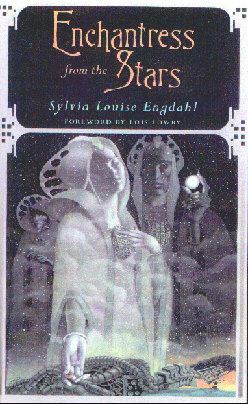
Walker edition (2001) |
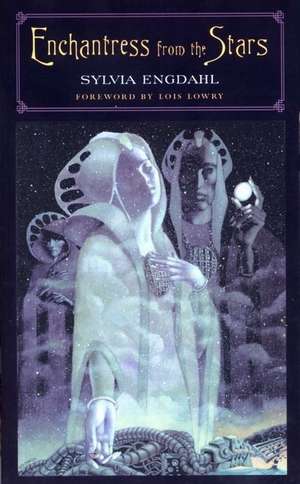
Firebird edition (2003) |
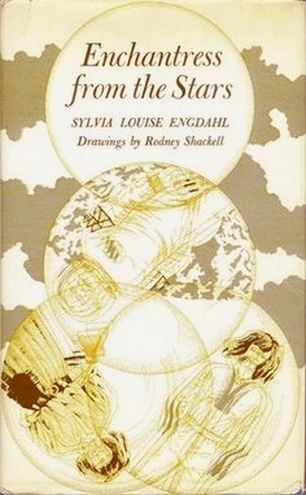
Atheneum edition (1970) |
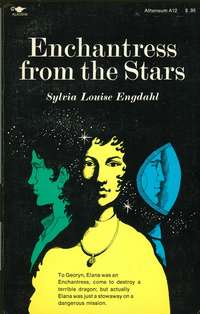
Aladdin edition (1972) |
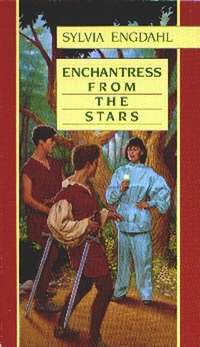
Collier edition (1989) |
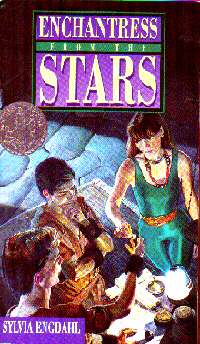
Troll edition (1989) |
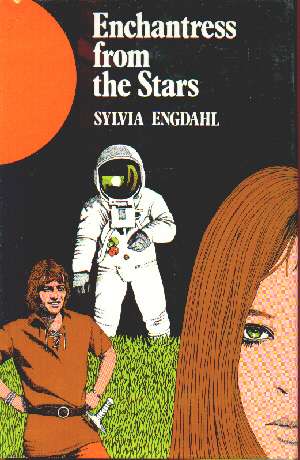
British edition (1974) |
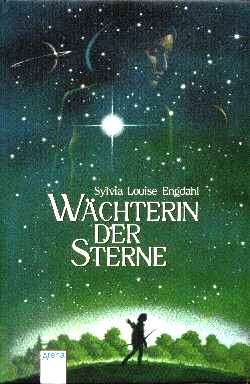
German edition:
Wachterin der Sterne (2002) |
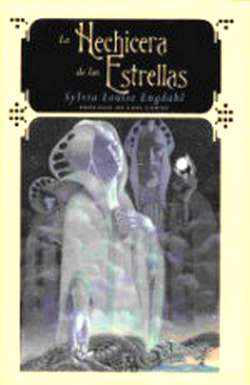
Spanish edition:
La Hechicera de las Estrellas (2002) |
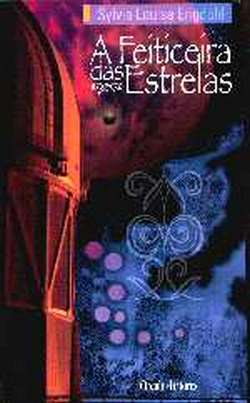
Portuguese edition:
A Feiticeira das Estrelas (2003) |
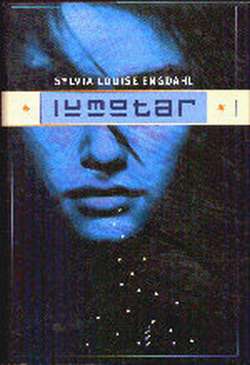
Finnish edition:
Lumotar (2003) |
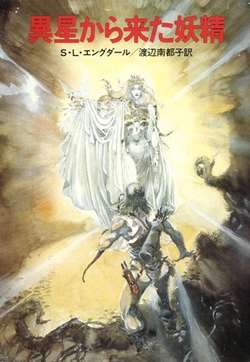
Japanese edition
(1982) |
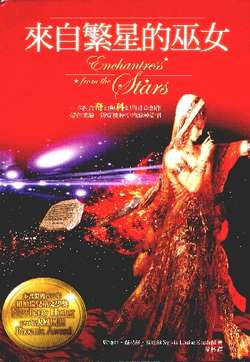
Chinese edition
(2003) |
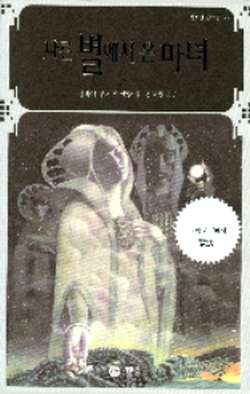
Korean edition
(2008) |
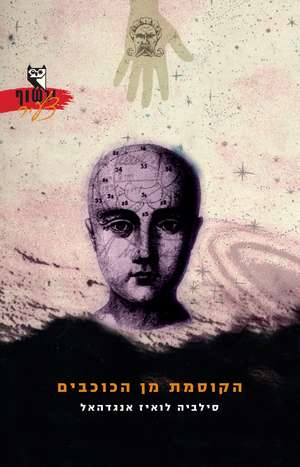
Hebrew edition
(2007) |
Do you really believe that civilizations exist elsewhere in the
universe?
Yes. For that reason among others, I don't consider my fiction fantasy
or even half fantasy, as some people in the children's literature field (but
not people in the science fiction field) have interpreted
Enchantress
from the Stars. Parts of it are told in the
style of fantasy, but that
does not mean there is any fantasy in the story. Of course, the details are
fantastic--I don't believe other intelligent species are as much alike physically
as they're shown to be in my fiction.
Why do you portray them that way, then?
For the same reason I write their dialogue in English--so that readers
will understand them. Also, I deliberately leave out the details of their
appearance so that readers can imagine them as they prefer (for instance, I
have always hoped that black readers would picture Elana as black). This is
one of the disagreements between my view and that of many writers in the SF
genre. In my opinion, emphasizing physical differences between intelligent
species detracts from reader identification. And it's not "realism" to do
it, because we don't know what they really look like in any case. They
certainly don't look like the actors in Star Trek!
Of course, in
Enchantress from the Stars there was another reason
for making all the characters essentially human in appearance, yet not
providing any details: the book deliberately leaves open the question of
which of the three civilizations is our own. Incidentally, though the story
makes clear that Elana does not resemble the natives of Andrecia closely
enough to be mistaken for one of them, the covers of the Collier, Troll, and
British editions show her as racially identical! (Authors do not choose a book's
art work and often don't even see it prior to its publication--although I did
get an advance look at the beautiful covers of the Walker and Bloomsbury
editions.)
There would be a complication if
Enchantress from the Stars were made into a movie or graphic novel. The plot is based on the premise that Elana and her father look so different from the Andrecians that they cannot pretend to be natives of the planet. But if either Elana or Georyn were shown as alien, it would settle the question of whether she is a past visitor to Earth or our descendent visiting another world, and I don't want that to happen- So the lhe only way to make them both human, yet obviously differerent from each other, is by skin color. Georyn would have to be white because the fairy-culture of the story is of European origin, very different from the legends of dark-skinned peoples on Earth (also I did say in the book that he has blond hair to avoid the stereotype of dark-skinned natives). This means that if Elana is physically potrayed, she must have relatively dark skin. That is how I show her on the cover of the current edition of
The Far Side of Evil.
How old is Elana supposed to be? The books don't say.
I couldn't state her age in terms of our years, since it's not said
whether she's descended from people of Earth. I have seen comments about
Enchantress in which different people referred to her as "a
14-year-old girl" and "a young woman of 20" and I don't know where they got
either of those assumptions! Actually, since she is a beginning student at
the Service Academy, which is like college, I picture her as about 17.
How do you pronounce the name Georyn?
It starts out just like George--JOR-IN, with the accent on the first
syllable. (In my earliest draft of the story I used different spellings
of it for the three different viewpoints, but I decided that was too
confusing.)
Do you believe other cultures are as much like ours as you
show them to be?
No, this too is literary license. After all, we don't know what their
cultures are like any more than we know their real physical appearance.
Science fiction that portrays radically different cultures usually aims to make points
relevant to our society, not to say anything about the actual universe. This
is a worthwhile aim, but mine happens to be something different. I believe
that some underlying truths are constant throughout the universe and that if
we're going to meet other species someday--as I'm sure we are--it's important
to expect something in common with them. There's already too much suspicion
of "aliens" among us. To be sure, it can be argued that showing manifestly
alien beings and alien cultures as "good guys" helps, and I think that may be
true in the case of TV and movies; but there, the personality of the actors
comes through and it is inescapably human, so that viewers naturally
sympathize. In written fiction, except the kind intended for sophisticated
science fiction readers with a lot of background, I think it's better to focus on
similarities.
Why did you portray the invaders in Enchantress from the
Stars in such a stereotyped way?
They're shown as comic-book style spacemen with ray guns for the same
reason that the fairy tale portion of the story is told in a traditional,
stylized form. It astonished me that some reviewers who recognized one
as a literary device thought the other was accidental!
Actually, I don't think a real spacefaring civilization would behave
as the Empire in the story does, any more than real medieval woodcutters
went around killing dragons. The story is based on a conventional
science fiction premise which at the time of its first publication was
still viewed as likely; perhaps that was why many readers thought it was
meant to be a realistic portrayal. Since, it has become more apparent
that even now--and certainly in the future when we have starships--our
culture as a whole wouldn't approve of colonizing inhabited planets.
Is Enchantress from the Stars meant to be an allegory
about relationships between cultures of our own world?
I've rephrased this in the form of a question. People don't ask it--they
just assume that's the case. It is not, except in the sense of advocating
respect for all humans, and of course, of opposing the takeover of land
that belongs to indigenous inhabitants. In this respect, portraying the three
species in the story as looking so much alike proved to cause confusion.
There are, to be sure, several levels in the story, some of which may be viewed
as allegory; but to interpret the relationship between Elana's people and
those of other worlds as applicable to intercultural relationships on Earth
is a false analogy. The three cultures in
Enchantress from the Stars
are of different species at different levels of evolution, whereas
members of the human race on our own planet are all of the same species.
None of us are more advanced, in an evolutionary sense, than people of
Earth's other cultures who are as much
Homo sapiens as we are.
However, there may be species in the universe that have existed longer
than ours, and someday we may visit even younger species.
Enchantress
is about our hypothetical relationships with
them, not between
ourselves.
What harm does it do for readers to assume that what's shown
about the relationship of the Federation to the Younglings applies to
intercultural relations on our world, as fantasy often does?
If the story is interpreted that way, it implies that some cultures
presently existing on Earth are inherently more "advanced" than others, an
idea once common that is frowned upon today. Technological capability is
a factor in the evolution of a species as a whole; it doesn't define the
"level" of particular cultures of the same species, any more than technical
training defines the evolutionary status of individuals. I have been
dismayed when readers got the impression that the Service in my books takes
an attitude toward Younglings similar to the patronizing way 19th-century
anthropologists viewed "primitive" cultures, which modern scientists
recognize as mistaken. (The book has been criticized on these grounds by
people with background in anthropology, and since I myself took many
graduate courses in anthropology, I find this misinterpretation expecially
troubling.) Also, I don't want it thought that I'm saying we
shouldn't help the people of pre-industrial cultures obtain technology, a
view that involves an additional false analogy because the cultures of a
single world, unlike those of different worlds, are aware of each other's
existence.
A species that has existed for eons
longer than our own, whatever its outward appearance, would have capabilities
far in advance of ours in addition to advanced technology. The difference
would be much deeper than a mere cultural difference. The psychic powers of
Elana's people, which in Younglings were merely latent, were meant to
suggest this; I could not show it in any more detail and still make her a
character with whom readers could identify. But it is to be assumed that
there is a wide gulf of time, not just environment, between inhabitants of
different worlds.
What gives the Federation the right to decide that Younglings aren't
mature enough to join, or even to visit Federation worlds as individuals?
Isn't this rather high-handed?
It's not an arbitrary judgment. My fictional premise is that a species is
accepted into the Federation when it has reached the stage where psychic
abilities such as telepathy and psychokinesis are commonly and safely used by
a majority of its members, who can therefore mingle freely with other such
species without posing a threat to anyone or finding themselves at a disadvantage.
Of course, I don't pretend to know whether this is what happens in the real universe,
although I suspect it is somewhere near the truth. Psychic powers as they are
depicted in the story are symbols of advanced abilities we can't yet even imagine.
In my recent adult novel
Envoy of the Flame I have specified the three
criteria by which the Service judges a world ready for membership. Its people
must have built interstellar ships and colonized uninhabited planets of many stars,
since a species can't outgrow aggressiveness while confined to a single planet with
finite resources. They must have eliminated racism among people of their own species,
so that they will interact wth other species without intolerance. And a sufficient
percentage of their people must have enough telepathic ability to communicate with
those of the Federation, because otherwise, lacking familiar physical clues, they could
not sense that strangers from different worlds were not hostile.
Do you really believe in the existence of ESP and other
paranormal powers?
Yes. I made up a lot of what I said about them in
Enchantress from the
Stars and
The Far Side of Evil and then, years later, I read of
research confirming many of the concepts I'd presented. To be sure, they're
extrapolated in the stories beyond anything we now know. And their impact on
Elana's civilization is largely ignored. A culture in which people could
control such powers consciously--and did not have to hide them as my
characters do when visiting on Youngling worlds--would be very different from
any that has ever existed on Earth.
I should make clear, though, that when I say I believe in the
paranormal, I don't mean in ghosts or in contact with departed spirits!
I have found that to many people that's what "paranormal" implies, but
it is a completely separate issue from the existence of such capabilities
as extrasensory perception and psychokinesis.
For more comments about these capabilities and a list of nonfiction books
on ESP and psychokinesis written by scientific researchers and other respected
scholars, see
ESP and Other Psi Powers
Are Real at this website.
Have you ever had paranormal experiences yourself?
No, I wish I had! But I am too analytical, too "left-brained," to have
that kind of experience. What's unusual about my case is that despite
this--and unlike most other science-oriented people--I have never doubted
that some individuals have them and that more will be learned about them
eventually. (For some of my views on paranormal capabilites and evolution,
see
The Role of of Psi In Human
Affairs at this website.)
Was Star Trek one of your inspirations for the Elana books?
I got the basic ideas for both
Enchantress and
The Far Side of
Evil, including the advanced civilization's strict policy of not intervening in the
affairs of younger worlds, in the late 1950s, long before Star Trek existed, so it irritates me when modern speculators about extraterrestrial civilizations assume that this concept of them was originated by StarTrek. But by the time I came to write the novels, I had seen a few Star Trek episodes (though I
didn't watch it regularly until much later, when it was rerun). And its
casual treatment of the "Prime Directive"--which Captain Kirk regularly
violated--was indeed one of the things that influenced me in creating a
Service whose members took their Oath seriously.
Is the Federation in your stories supposed to be the same
Federation as the one in Star Trek? If not, why did you use that term?
I chose it when I first wrote parts of the story in the 1950s, so it
certainly wasn't derived from Star Trek! "Federation" is a generic term in
science fiction even apart from its use as a common English word. As a
matter of fact, it's sometimes used by astronomers who write scientific
papers about the possibilty of contacting extraterrestrial civilizations.
It's a term no more unique to the Star Trek universe than "starship."
What kind of changes are in the 2018 Bloomsbury edition?
Mainly, generic masculine nouns and pronouns--the use of which was standard in 1970 when the book was first published--have been replaced with gender-neutral language. There are also a few minor wording changes for clarification.
How many different editions of Enchantress from the Stars exist?
There are 12 in English, plus 9 translations and some ebooks and audiobooks in different formats. Many sites on the Web show the wrong ISBNs for the editions they describe, which makes choosing used copies difficult. Here is a list of the correct ones for the English print editions in order of publication.
0689205082 Atheneum HC, 1970
0689703090 Aladdin (Atheneum) PB, 1972
0575018364 Gollancz HC, 1974 (UK)
0020430310 Collier (Macmillan) PB, 1989
0020430310 Troll PB, 1989 (book club)
0844664480 Peter Smith HC, 1991 (library binding)
0802787649 Walker HC, 2001
0439374898 Scholastic PB, 2001 (book club)
0142500372 Firebird (Penguin) PB, 2003
0613616197 Turtleback HC, 2003 (library binding)
1435202465 Paw Prints HC 2007 (library binding)
1681196131 Bloomsbury PB, 2018
Do you believe ETs are really observing our world?
I don't know. I do believe, as my novels say, that advanced ones wouldn't
reveal themselves because they'd know it would harm us by interfering with our
evolution. At the time I wrote my YA novels, and even when I wrote my
nonfiction book
The Planet-Girded Suns, I could not find any other
writer who seriously proposed this as a reason why we haven't been contacted.
Since then, there have been several.
Why do you emphasize it so much in your fiction?
Because I don't think it's good for young people to think of ETs as Gods
from Outer Space who will solve our problems for us. I believe we'll need to
make the effort to explore the universe on our own. Also, I consider it very
harmful for young people (or for anyone) to view Earth's problems as evidence
that there's something wrong with us as a species--that advanced aliens would
consider us inferior instead of just immature. That all-too-prevalent idea
leads to defeatism instead of to achievement, and besides, I don't think
it's true.
Is there a sequel to Enchantress from the Stars?
No. There is a second book titled
The Far Side of Evil about Elana
when she is older, but none of the other characters from
Enchantress
appear in it and it's a very different, and much darker, kind of story. I don't recommend
it to readers below high school age. Publishers have tried to promote it as a sequel
appropriate for children because
Enchantress was so successful, but
I have always believed that was a mistake--the younger readers didn't like it, while
the older readers for whom it was meant didn't find it when it was shelved with
children's books. I regret having connected the two novels by using the same
heroine in both, since they are independent stories that can be read in either order.
Are you going to write another book about Elana?
I'd have liked to, but I didn't have any ideas for key events that would
make a story compatible with the premises I'd established about the
Service--though I had plenty for themes and settings. (Unlike the
writers of Star Trek, I'm unwilling to have my characters violate their
basic non-intervention policy merely for plot convenience, and this
severely limits their involvement in the affairs of hypothetical worlds.)
I felt sad about this when people wrote and asked me to write another,
as if I could simply choose to do so! Stories must arise in an author's
mind before they can be put into words; it takes more than writing
ability to create fiction, and more than speculation about the universe.
In any case, Elana is already a college graduate in
The Far Side of
Evil and in a third novel she would have had to be even older, so she
could not have been been the main character in another teen book.
I have, however, written other books about the Service. It appears
in
The Doors of the Universe, (the third book of my
Children of the
Star trilogy) and with much more detail in my Captain of Estel trilogy,
especially its second two books
Herald of the Flame and
Envoy of
the Flame (which are adult novels that contain some material inppropriate for readers below high school age.)
Apart from the misinterpretations of the story discussed above, is there anything you regret about the reception of Enchantress?
Yes. I very much regret that it is called a children's book, which is due to the way it has been, and still is, promoted by its publishers. According to modern termiology Enchantress from the Stars is not a children's book; it is a Young Adult novel that exceptional children enjoy. At the time it was first published the mislabeling was inevitable because all books not meant for adults were issued as "children's books"; there was no YA category then. Few books were written for teens because teens weren't thought to be interested in serious issues; there were still taboos as to how much realism was allowed in books for them; and, more significantly. because books for young readers were sold almost exclusively to schools and libraries, which sought fiction suitable for those of elementary school age. Publishers therefore labeled books with the age range that sold best, regardless of their actual content. Reviewers focused on llterary quality, with advanced readers rather than average kids in mind.
In one way this unrealistic system benefitted Enchantress--it resulted in its winning a Newbery Honor, for which only children's books are eligible, despite having no child characters. And of course I was elated by that. It put the book into the hands of countless people who would never have seen it otherwise. But it was a mixed blessing, for Enchantress has been given to a great many children too young to grasp more of it than the story's overt action, yet missed by its intended audience of teenage readers who don't visit chidren's rooms of libraries. Incredibly, its current publisher still labels it "age 8 to 12" and advertises it in the "middle grades" category, thus ensuring that the new edition won't be discovered either by adults who remember it fondly or by the many thoughtful YA readers who would be fascinatd by it today.
My Interview with the Trumpet Book Club
(This interview took place in the fall of 2001. Since it is no
longer at Trumpet's website, I am posting it here.)
TRUMPET: Enchantress from the Stars is told in a three-person
narrative. Did you enjoy writing from the various perspectives? Did it help
you tell your story or make it harder to tell?
I never imagined it being in another form--the three perspectives and
three styles of narrative were part of my original conception of the story,
and I couldn't have told it any other way.
TRUMPET: Enchantress from the Stars is, at times, very
philosophical. It does not talk down to its readers at all! What impression
do you hope young readers will walk away with? What is your favorite part of
the book?
On one level, I hope they will take it literally in the sense of not
thinking that sooner or later extraterrestrial civilizations will help solve
our planet's problems for us (which some radio astronomers actually hope may
happen)--and, most importantly, of not thinking that those problems mean
we're an inherently bad species with which something has "gone wrong" (an
idea often promoted by science fiction, as well as by all too much
nonfiction). I hope they will view the future optimistically, believing that
our civilization will progress as it continues to mature. On another and
more fundamental level, I hope they will come away with the knowledge that
truth can be expressed in many forms, and that perceptions of reality that
don't match one's own are worthy of respect.
TRUMPET: What was the inspiration behind Enchantress from the
Stars? How did the story come about? Did you have the characters, the
setting, or the plot first in your mind?
I first got the idea for the story back in 1957, long before I wrote more
than a few pages of it. What occurred to me then was the concept of the
three peoples seeing the colonists' activity in different ways, and the
strategy the advanced anthropologists would use to prevent the planet from
being taken over. I had the main characters in mind, but they were older; I
imagined it as adult science fiction rather than as a book for children.
TRUMPET: The love story between Georyn and the Enchantress from
the stars is so beautifully told. Was there any part of you that wished
they could be together in the end? What inspiration did you draw upon for
the love story aspect of the book?
The idea I started with involved no love story; when I began to write the
book and develop the characters as young people, it just happened! Of
course, the plot depends on it--but to begin with, I didn't have a whole
plot. I didn't know the means whereby Georyn could succeed in his quest
until I was well along in the writing. Yes, certainly a part of me wished
Georyn and the Enchantress could stay together, but I was too absorbed in
the viewpoint of her civilization to think that could be a happy ending for
either of them.
TRUMPET: When you first wrote Enchantress from the Stars,
did you have any idea that it might be so warmly received or win the
Newbery?
When I wrote it in 1968, I didn't think there was much chance of its
being published at all! I had just completed my first novel for young people
(Journey Between Worlds, a more conventional love story) and I began
work on Enchantress from the Stars simply for fun while waiting for
Journey to find a publisher. Enchantress from the Stars
obviously didn't fit the adult science fiction market, yet I thought it was
too long and complicated to be published as a children's book. But I got
wrapped up in it and couldn't bear not to show it to anyone after I finished
it, so I submitted it to Atheneum (which later took Journey also)
because they had published the longest children's book I could find in the
library. I was surprised when it was accepted, and completely astonished
when it received the Newbery Honor.
TRUMPET: The great thing about Enchantress from the Stars is
that it has a mass appeal that goes beyond strict sci-fi fans. What would
you say to kids who do not gravitate towards the science fiction/fantasy
genre? What are they missing out on?
My desire to write about other worlds arises from my belief that
humanity's future lies in space and that therefore, how people view the
universe beyond Earth is extremely important. So I've always aimed to reach
a wider audience than fans of a particular genre. This was one reason I
chose to write for young people, where my books would be edited and reviewed
by non-specialists, rather than for the SF market. I think there are too few
science fiction novels that appeal to people outside that genre (the reason
there aren't more is that most fans with a lot of background don't like
books that readers without such background can understand). To readers of
any age who don't gravitate toward SF, I can only say: not all books set in
future or hypothetical worlds are as "far out" as those rated highest by
specialists; some provide a lot for people concerned about real life to
think about--and these are most apt to be found among Young Adult books or
adult novels placed on YA shelves by librarians.
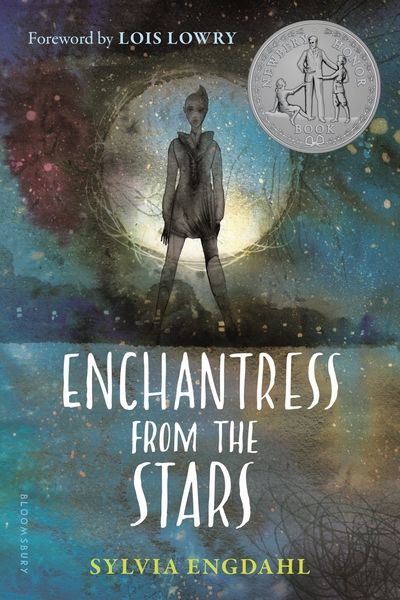
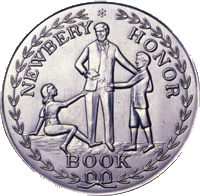 Read the author's essay Reflections on Enchantress from the Stars, a more detailed and formal presentation of things she has said in the FAQ below and elsewhere for many years. It's especially important if you are a teacher who has discussed the book with young readers.
Read the author's essay Reflections on Enchantress from the Stars, a more detailed and formal presentation of things she has said in the FAQ below and elsewhere for many years. It's especially important if you are a teacher who has discussed the book with young readers.  Purchase the audiobook from Amazon,
Audible, or
iTunes.
Purchase the audiobook from Amazon,
Audible, or
iTunes.













